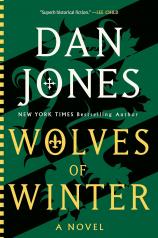Wolves of Winter
Review
Wolves of Winter
If you pay any attention to the publishing world, you should be familiar with the issue of what is generally called “representation.” Authors have always put elements of themselves in their characters; you can’t avoid it. Representation is sort of the identity politics version of this.
The recent trendy example (not to mention a tremendous hit) is the YA fantasy novel FOURTH WING, in which the heroine just so happens to have exactly the same genetic illness as the author, Rebecca Yarros. “It was important to me to represent this chronic illness because my four sons and I all have the hypermobile type of Ehlers-Danlos,” Yarros told a Health.com reporter. “Growing up, I never saw that kind of representation in the fantasy genre or a character in the type of chronic pain I live with.” Well, as they say, you can’t argue with results.
"WOLVES OF WINTER is solid historical fiction that doesn’t take itself, or its history, too seriously. Jones populates the book with memorable characters: stalwart heroes, braggadocious leaders, and a young archer who can’t keep himself out of trouble."
I only bring this up to say that the lead character in WOLVES OF WINTER, the second book in Dan Jones’ trilogy that began with ESSEX DOGS, is a middle-aged guy with a pot belly who gets winded while trying to run and would like nothing more than to go home and drink a beer. I feel seen.
I don’t mean to poke fun at Yarros (I've been informed by one of my 14-year-olds that I'm not allowed to do this). It’s just my way of pointing out that Jones is taking the road less traveled in these books. Generally speaking, the hero of your typical historical warfare series is a doughty warrior who is fearless in the face of enemy fire, the man you want to lead a forlorn hope against the walls of an enemy fortress. That is not exactly who Loveday FitzTalbot, leader of the Essex Dogs, is. He certainly isn’t clueless; he’s a competent and experienced soldier of fortune and a caring and concerned captain of his misfit crew, who are knocking around France during the Hundred Years’ War. But he has serious doubts about the mission and his ability to lead his troops against the hated French.
WOLVES OF WINTER is perhaps half a step behind the enormously entertaining ESSEX DOGS, simply because the central conflict of the first book was the Battle of Crecy, and this one features the Siege of Calais. This siege-warfare aspect means that the characters spend a lot of time in camp. Jones is a serious historian (which doesn’t stop him from taking the occasional liberty with history), so he can’t deviate too much from the script. This is most evident in the treatment of the primary English antagonist, who can’t get the comeuppance that he deserves. He didn’t get it at the time, and there’s nothing you can do about it now.
Jones’ writing remains sprightly, and he brings in all manner of interesting new characters. Are there pirates here? Yes. Expostulating English lords with ridiculous hair sending our boys into battle? Yes. Dank dungeons? Sketchy ale halls? Psychedelic forest mushrooms? The novel has all of this in spades --- not to mention actual spades, because there’s a fair share of ditch-digging as well.
WOLVES OF WINTER is solid historical fiction that doesn’t take itself, or its history, too seriously. Jones populates the book with memorable characters: stalwart heroes, braggadocious leaders, and a young archer who can’t keep himself out of trouble. You may not recognize yourself in any of these individuals, but it’s still an entertaining read that sets its audience up for the third and final installment.
Reviewed by Curtis Edmonds on February 2, 2024
Wolves of Winter
- Publication Date: January 30, 2024
- Genres: Fiction, Historical Fiction, Historical Thriller, Suspense, Thriller
- Hardcover: 416 pages
- Publisher: Viking
- ISBN-10: 0593653793
- ISBN-13: 9780593653791




